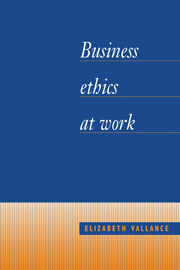10 - The shape of things to come
Published online by Cambridge University Press: 05 June 2012
Summary
The '90s is the decade of corporate democracy.
(Professor John Pound)What impresses me about Japan is they have these statements about values and missions and they believe them. We have them and nobody pays any attention.
(Professor Charles Handy)What should the ethical business look like? And why are we now asking questions about the nature and ends of business, the answers to which we seemed to take for granted in the past? It has been the argument of this book that the aim of business is to secure long-term owner value by selling its wares in as effective and efficient a manner as it knows how. It is this aim, rather than vague social concerns or existential preoccupations, which differentiates business from other, perfectly acceptable but different, forms of social activity. The idea thus stated may seem uncontentious, not to say obvious, but it is nevertheless not universally accepted.
It is argued by some commentators – and assumed by many more – that there is now much more to the game plan of modern business than this basic, albeit intelligible end: that whatever business may have been in the past, it is now a much more complex social phenomenon with consequent social as well as economic ends. The first part of this statement is clearly true: business is more complex, more interrelated with other social phenomena than before.
- Type
- Chapter
- Information
- Business Ethics at Work , pp. 170 - 184Publisher: Cambridge University PressPrint publication year: 1995



